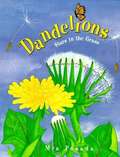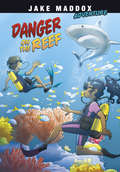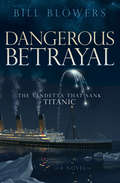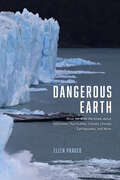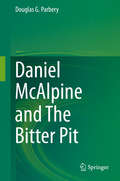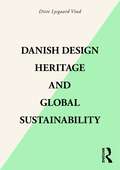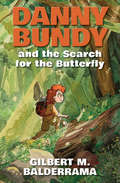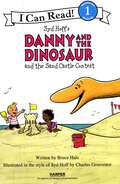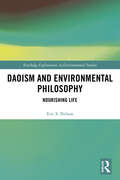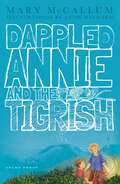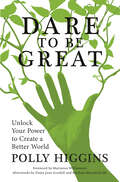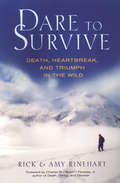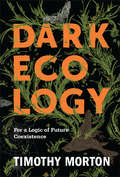- Table View
- List View
Dandelions in a Jelly Jar (Lake Emily Series Book #2)
by Traci L. DepreeThe young Morgan family continues to struggle to hold the farm together and Virginia tries to help Jessie and her father through difficult times. Things will never be the same in peaceful Lake Emily, Minnesota. School-board cutbacks prompt flamboyant art teacher Trudy Ploog to wage war on the foundation of small-town life---high school sports! Meanwhile, Peter and Mae Morgan grieve a loss . . . and learn to see with the eyes of grace.
Dandelions: Stars in the Grass
by Mia PosadaRhyming text presents the dandelion, not as a weed, but as a flower of great beauty. Includes information about the flower, a recipe, and science activities.
Dandylion Summer
by Frann Preston-GannonFrann Preston-Gannon's Dandylion Summer is a sweet, character-driven picture book.When two sisters make a wish upon a dandelion, the seeds scatter and bring them Dandylion, a friend to play with all summer long. Together, they go on lots of adventures.As the seasons change, Dandylion must say goodbye—but fall is on the way, with new friends to meet and wonders to explore!
Danger in the Deep Sea (OceanX Adventures)
by Kate B. JeromeDive into an OceanX Adventure! Marena Montoya and her BFF Aisha go on a brand-new ocean adventure using their scientific skills to solve another mysterious puzzle.Lucas' voice broke the silence. "Remember the lessons you learned on the OceanXplorer. Colin said always prepare for the unexpected..." I finished the sentence for him. "...and when it happens, don't panic. Just think your way through it." Science reporter and budding junior detective Marena Montoya comes to the rescue in the next adventure in the OceanX series. Marena has discovered an important clue about a treasure-laden Spanish galleon lost at sea centuries ago, but has no idea how she could search for the ship until a wild series of events lands her, and her older brother Lucas, straight into the hunt. Using her newfound skills from her time aboard the OceanXplorer, Marena bravely navigates the perils of deep-sea exploration, and learns the most important lesson of all—that there is more than one type of treasure. This page-turning adventure combines the scientific discoveries of the world-renowned OceanX project with an intrepid new heroine who learns the power of speaking up, asking questions, and learning from mistakes. MEET THE OCEAN EXPLORERS: 5th-grade junior journalist Marena, her BFF Aisha, and Marena&’s teenage brother Lucas use critical thinking and sound science to solve exciting ocean mysteries. MENTORED BY OCEANX: Marena and Aisha are mentored by Dr. Anna Knowles, whose character is inspired by the real-life scientists of the world-renowned OceanX project. REAL SCIENCE: Each mystery is based on actual oceanic scientific research and discoveries, filled with facts about the ocean world. MIDDLE-GRADE MILESTONES: Once proud of her curiosity and endless questions, 11-year-old Marena is starting to feel self-conscious about calling attention to herself. With the encouragement of her teacher and mentor, she learns to embrace the qualities that make her special. COLLECT THE SERIES: Mystery at the Aquarium, Underwater Secret Agent, and Galapagos Island Hitch also available!
Danger on the Reef (Jake Maddox Adventure)
by Jake MaddoxJasmine Lopez and her brother Arjun love exploring the coral reefs around Fiji, where their marine biologist parents are stationed. Jasmine, already a certified scuba diver, dreams of following in her parents' footsteps and wants to help Arjun do the same. Unfortunately her younger brother is sure he already knows everything. That attitude gets them into danger when Arjun drifts too far from the group during a dive — and straight into a reef shark.
Danger--Landslides! (Houghton Mifflin Harcourt Vocabulary Readers #Leveled Reader: Level: 4, Theme: 6.2)
by Linda HartleyIntroduces children to landslides.
Dangerous Betrayal: The Vendetta That Sank Titanic: A Novel
by Bill BlowersIngeniously blending fact and thrilling speculative fiction, this award-winning novel unveils a conspiratorial sabotage behind the Titanic disaster. How was it that the unsinkable Titanic, carrying 1320 passengers and a crew of 892, sank in freezing waters—especially when the technology of luxury liner was such that she could have easily avoided the impact with the iceberg? Was it a fated and bizarre accident? Or was it the result of a sinister plot to undermine the success of White Star Lines&’ feature attraction on her maiden voyage? At the heart of the mystery: the most brilliant inventor of the era—Nikola Tesla—and a plot to hold the Titanic hostage that went catastrophically wrong. For more than a century, the secret lay hidden in the bowels of the Titanic at the bottom of the North Atlantic. Now, in this bracing and plausible novel of conspiracy and revenge, set in a gilded age of ruthless power barons, geniuses, and madmen, does the truth finally surface.
Dangerous Earth: What We Wish We Knew about Volcanoes, Hurricanes, Climate Change, Earthquakes, and More
by Ellen PragerThe Earth is a beautiful and wondrous planet, but also frustratingly complex and, at times, violent: much of what has made it livable can also cause catastrophe. Volcanic eruptions create land and produce fertile, nutrient-rich soil, but they can also bury forests, fields, and entire towns under ash, mud, lava, and debris. The very forces that create and recycle Earth’s crust also spawn destructive earthquakes and tsunamis. Water and wind bring and spread life, but in hurricanes they can leave devastation in their wake. And while it is the planet’s warmth that enables life to thrive, rapidly increasing temperatures are causing sea levels to rise and weather events to become more extreme. Today, we know more than ever before about the powerful forces that can cause catastrophe, but significant questions remain. Why can’t we better predict some natural disasters? What do scientists know about them already? What do they wish they knew? In Dangerous Earth, marine scientist and science communicator Ellen Prager explores the science of investigating volcanoes, earthquakes, tsunamis, hurricanes, landslides, rip currents, and—maybe the most perilous hazard of all—climate change. Each chapter considers a specific hazard, begins with a game-changing historical event (like the 1980 eruption of Mt. St. Helens or the landfall and impacts of Hurricane Harvey), and highlights what remains unknown about these dynamic phenomena. Along the way, we hear from scientists trying to read Earth’s warning signs, pass its messages along to the rest of us, and prevent catastrophic loss. A sweeping tour of some of the most awesome forces on our planet—many tragic, yet nonetheless awe-inspiring—Dangerous Earth is an illuminating journey through the undiscovered, unresolved, and in some cases unimagined mysteries that continue to frustrate and fascinate the world’s leading scientists: the “wish-we-knews” that ignite both our curiosity and global change.
Daniel Boone’s Window: Poems (Southern Messenger Poets)
by Matthew WimberleyDaniel Boone’s Window, a new book of poetry by Matthew Wimberley, meditates on the past and future of contemporary Appalachia through explorations of both mythologized and actual landscapes. In poems that confront a region indelibly shaped by environmental turmoil, economic erasure, and the weight of an outside world intent on destroying it, Daniel Boone’s Window works to reclaim and reckon with the realities and complexities of Appalachia. Wimberley’s poetry seeks to dispel monolithic narratives of the region by capturing the rugged and the beautiful, approaching place with wonderment that subverts stereotype and blame.
Daniel McAlpine and The Bitter Pit
by Douglas G. ParberyThis book is a biography of a scientist who pioneered the development of plant pathology in Australia in the 19th and early 20th century, and was internationally acclaimed. After 20 years as a plant pathologist, he was asked to find the cause and cure of a serious physiological disorder of apples. While the cause eluded him, and everyone else for another 60 years, he again won international gratitude for the improvements he brought to the apple industry. However because he did not find the cause, he was deemed to have failed by his political masters who were malignantly influenced by a jealous rival. The discovery in 2012-2013 of government files covering the period of the bitter pit investigation, from 1911 to 1916; reveal the extent of the unjust criticism of McAlpine while history has vindicated the management recommendations made to reduce bitter-pit losses. The focus on bitter-pit management late in McAlpine's Career also meant that those who value his memory have been less aware of the remarkable achievements of McAlpine in the time before he left Great Britain - the brilliance of his teaching and drawing skills -featured in the early teaching texts for botany and zoology (the latter with his brother) which are now accessible on-line. The objective of this book is to demonstrate that (i) the view that McAlpine had failed in his quest was wrong and seriously unjust (ii) McAlpine achievements extend beyond plant pathology and include significant contributions to the 19th century teaching of botany and zoology, contributions which reinforce the adage - a picture is worth a 1,000 words.
Danish Design Heritage and Global Sustainability
by Ditte Lysgaard VindWith a bias for action, this book offers valuable insights into the origins of the much-celebrated Danish design tradition and how it can be employed to create design solutions to address today’s environmental crisis using the planetary boundaries as positive creative constraints. Danish design has long been revered for its high-quality aesthetics, materials and craftmanship, encouraging sustainability without compromise. This book explores the lessons to be learnt from Scandinavian design ideals, introduces the philosophy and principles of circular economy and showcases the potential power of combining circular economy and design in helping to mitigate the effects of climate change. It presents a range of case study examples across multiple sectors and includes interviews with Danish designers from architecture, furniture, fashion, digital and industrial design, providing unique insights by some of the world’s leading contemporary designers. Bridging theory and real-world insights and experiences, this book builds on the framework of the 4Rs – The Circular Way: Reduce, Reuse, Recycle and Replace to encourage innovation through the replacement of environmentally damaging materials and business models. A must-read for product designers, industrial designers, consultants, business developers, sustainability professionals and students interested in learning how to design and implement circular, sustainable models into practice.
Danny Bundy and the Search for the Butterfly
by Gilbert M. BalderramaA little boy&’s search for a butterfly takes him on an epic adventure through the woods behind his house in this illustrated children&’s story.Young adventurer Danny Bundy loves to explore the forest behind his house. There is so much to see in there! The other boys in his class like to trap bullfrogs and other animals, but for show-and-tell on Monday, Danny is looking for something much more beautiful: a monarch butterfly. But this forest has more in store for Danny—and now he's in for a real adventure.As readers travel through the woods with Danny, they learn about the different plants and animals that live there. Along with informative vocabulary, Danny learns how to respect our environment and fellow creatures, including Bernie the Bullfrog, Lady Sue the Squirrel, and more!
Danny and the Dinosaur Go to Camp (I Can Read! #Level 1)
by Syd HoffFrom the book jacket: Guess who's going to summer camp with Danny? <P><P> His friend the dinosaur. An expert at foot races and football, and happy to help when weary hikers need a lift, this gigantic camper is a huge hit. <P><P> Since the publication of Danny and the Dinosaur in 1958, the popular pair has been a favorite for beginning readers everywhere, who, like Danny, love the dinosaur as much for the measure of his size as for the largeness of his heart. <P> Those who enjoy this book may also want to read "Happy Birthday, Danny and the Dinosaur!" (also available from Bookshare). <P> This file should make an excellent embossed braille copy. AGES 3-7
Danny and the Dinosaur and the Sand Castle Contest (I Can Read Level 1 Ser.)
by Bruce HaleYoung beach goers will giggle as Danny works with his overeager friend to build the perfect sand castle. A gentle message in support of being kind and helpful even during a competition will be appreciated by parents and caregivers. Readers first fell in love with Danny and his prehistoric pal in the I Can Read classic Danny and the Dinosaur, created by Syd Hoff in 1958. Now the popular pair is together again in this sweet and funny adventure sure to win over a new generation of beginning readers. Danny and the Dinosaur and the Sand Castle Contest is a Level One I Can Read, which means it’s perfect for children learning to sound out words and sentences.
Daoism and Environmental Philosophy: Nourishing Life (Routledge Explorations in Environmental Studies)
by Eric S. NelsonDaoism and Environmental Philosophy explores ethics and the philosophy of nature in the Daodejing, the Zhuangzi, and related texts to elucidate their potential significance in our contemporary environmental crisis. This book traces early Daoist depictions of practices of embodied emptying and forgetting and communicative strategies of undoing the fixations of words, things, and the embodied self. These are aspects of an ethics of embracing plainness and simplicity, nourishing the asymmetrically differentiated yet shared elemental body of life of the myriad things, and being responsively attuned in encountering and responding to things. These critical and transformative dimensions of early Daoism provide exemplary models and insights for cultivating a more expansive ecological ethos, environmental culture of nature, and progressive political ecology. This work will be of interest to students and scholars interested in philosophy, environmental ethics and philosophy, religious studies, and intellectual history.
Dappled Annie and the Tigrish
by Mary McCallumA beautiful story of nature, family, bravery, and a touch of something magical. There are faces in the hedge at the end of the garden, and a nest of tiny fantails, and that's where nine-year-old Annie gets to play one hot summer while her father works up at the lighthouse. One after another, an earthquake and a terrible wind leave Annie with losses that seem irreplaceable, and her little brother Robbie emerges as the only person who can help her find what she's lost―him and the tigrish.
Dare to Be Great: Unlock Your Power to Create a Better World
by Jane Goodall Marianne Williamson Michael Mansfield Polly Higgins‘I know it may not yet look like it, but we are sowing the seeds of greatness for countless generations to come. That is the Great Work of our times. Yours and mine.’ This is a book unlike any other. It does not tell you what you must do, it does not set out a guide for the 10 definitive steps to becoming great by next Thursday. Dare To Be Great is both a playful, inspirational conversation and a heartfelt, lived call, daring each one of us and our society as a whole to become truly great. Celebrated Earth lawyer Polly Higgins was a luminary in the environmental justice movement as she worked to Stop Ecocide across the globe. She was a beacon for how to live the brave, bold lives that, at our best, we imagine for ourselves. This book shares insights from her own remarkable journey, inspiring us to recognise and step into a greatness within – that is not about grandiosity but something far more exciting: aligning with our unique purpose in service of a better world.
Dare to Survive: Death, Heartbreak, and Triumph in the Wild
by Amy Rick RinehartWith its towering mountains, sun-scorched deserts, fierce wildlife, and hard-to-predict weather, the American West ranks among the most forbidding places on Earth. Yet many are drawn to the beauty of this wild and rugged region. Some are daredevils. . . some are athletes. . . and some are outdoors enthusiasts who find themselves in a chilling battle for survival. In their extraordinary, heart-stopping true stories, you will discover how much can go wrong when people find themselves caught in the cross-hairs of nature's power. . . Dare To Survive Flash floods, plane crashes, animal attacks, avalanches, landslides--these devastating phenomena all too often claim the lives of men, women, and children in the American West. But some beat the odds, living to tell about their terrifying ordeals. There are inspirational stories of extreme survival and tremendous bravery. Of the hiker who--though armed with only a knife--survived a 30-minute nightmare with a cougar. . . of the backcountry snowboarder buried alive by an avalanche, saved with only minutes to spare. . . of the outdoorsman pinned by an 800-pound boulder who freed himself by amputating his own arm. And there are the unexplainable, senseless tragedies--the little girl whose mysterious disappearance at a national park was never solved. . . the inexperienced charter pilot who crashed trying to beat curfew in a snowstorm. . . and the veteran backwoods camper who, despite every precaution, fell victim to a fatal bear attack. What does it take to endure the impossible? Dare to Survive tackles that question as it vividly reminds us that when danger strikes, survival becomes the ultimate human challenge. "This frightening but enjoyable book reveals that Mother Nature has more ways to kill than even the toughest Mafia godfather. " --Ted Schwarz, author of Hollywood Confidential: How the Studios Beat the Mob at Their Own Game Rick Rinehart is a publisher, writer, and former Colorado Humanities Scholar whose honors include recognition by the National Park Service for contributions to wolf recovery in Yellowstone National Park. His wife, Amy Rinehart, is a former publisher of endurance sports books who consults with outdoor retail and environmental organizations in the development of publishing programs. Rick and Amy live in Lafayette, Colorado.
Daring Dolphin Rescue (OceanX Adventures)
by Kate B. JeromeA Simon & Schuster eBook. Simon & Schuster has a great book for every reader.
Daring to Be Abigail
by Rachel VailDuring her summer at Camp Nashaquitsa, eleven-year-old Abby tries to reinvent herself, while worrying about her mother, missing her dead father, and getting to know her equally self-conscious bunkmates.
Dark Blue Rising
by Teri TerryThe stunning first novel in a new speculative thriller trilogy from the bestselling author of SLATED.Tabby lives a transient life with her mum Cate, never sticking in one place long enough to make friends. Until one day, an accident changes everything. Cate is arrested and Tabby realises her life has been a lie: Cate is not her mother.As she adjusts to her new life, Tabby finds herself drawn to the ocean - the only place she feels happy - and enrolls at a swimming summer school to help her heal.But all is not as it seems. She and her new friends are cut off from the outside world and she's plagued by a repeating symbol of interlocking circles that follows her everywhere.As Tabby begins to learn the truth about what the circles mean, and uncovers the terrible lies she's been told about her past, a final twist awaits her - a secret hidden in her DNA...
Dark Ecology: For a Logic of Future Coexistence (The Wellek Library Lectures)
by Timothy MortonTimothy Morton argues that ecological awareness in the present Anthropocene era takes the form of a strange loop or Möbius strip, twisted to have only one side. Deckard travels this oedipal path in Blade Runner (1982) when he learns that he might be the enemy he has been ordered to pursue. Ecological awareness takes this shape because ecological phenomena have a loop form that is also fundamental to the structure of how things are.The logistics of agricultural society resulted in global warming and hardwired dangerous ideas about life-forms into the human mind. Dark ecology puts us in an uncanny position of radical self-knowledge, illuminating our place in the biosphere and our belonging to a species in a sense that is far less obvious than we like to think. Morton explores the logical foundations of the ecological crisis, which is suffused with the melancholy and negativity of coexistence yet evolving, as we explore its loop form, into something playful, anarchic, and comedic. His work is a skilled fusion of humanities and scientific scholarship, incorporating the theories and findings of philosophy, anthropology, literature, ecology, biology, and physics. Morton hopes to reestablish our ties to nonhuman beings and to help us rediscover the playfulness and joy that can brighten the dark, strange loop we traverse.
Dark Emperor and Other Poems of the Night
by Joyce SidmanCome feel the cool and shadowed breeze, come smell your way among the trees, come touch rough bark and leathered leaves: Welcome to the night. Welcome to the night, where mice stir and furry moths flutter. Where snails spiral into shells as orb spiders circle in silk. Where the roots of oak trees recover and repair from their time in the light. Where the porcupette eats delicacies-raspberry leaves!-and coos and sings. Come out to the cool, night wood, and buzz and hoot and howl-but do beware of the great horned owl-for it's wild and it's windy way out in the woods!<P><P> Newbery Medal Honor book
Dark Hunters (Bionicle)
by Greg FarshteyThe Dark Hunters stand in direct opposition to the Toa. But who are they? Where did they come from? And who - - or what -- motivates them? It's an inside look at the villains of the Bionicle world.

